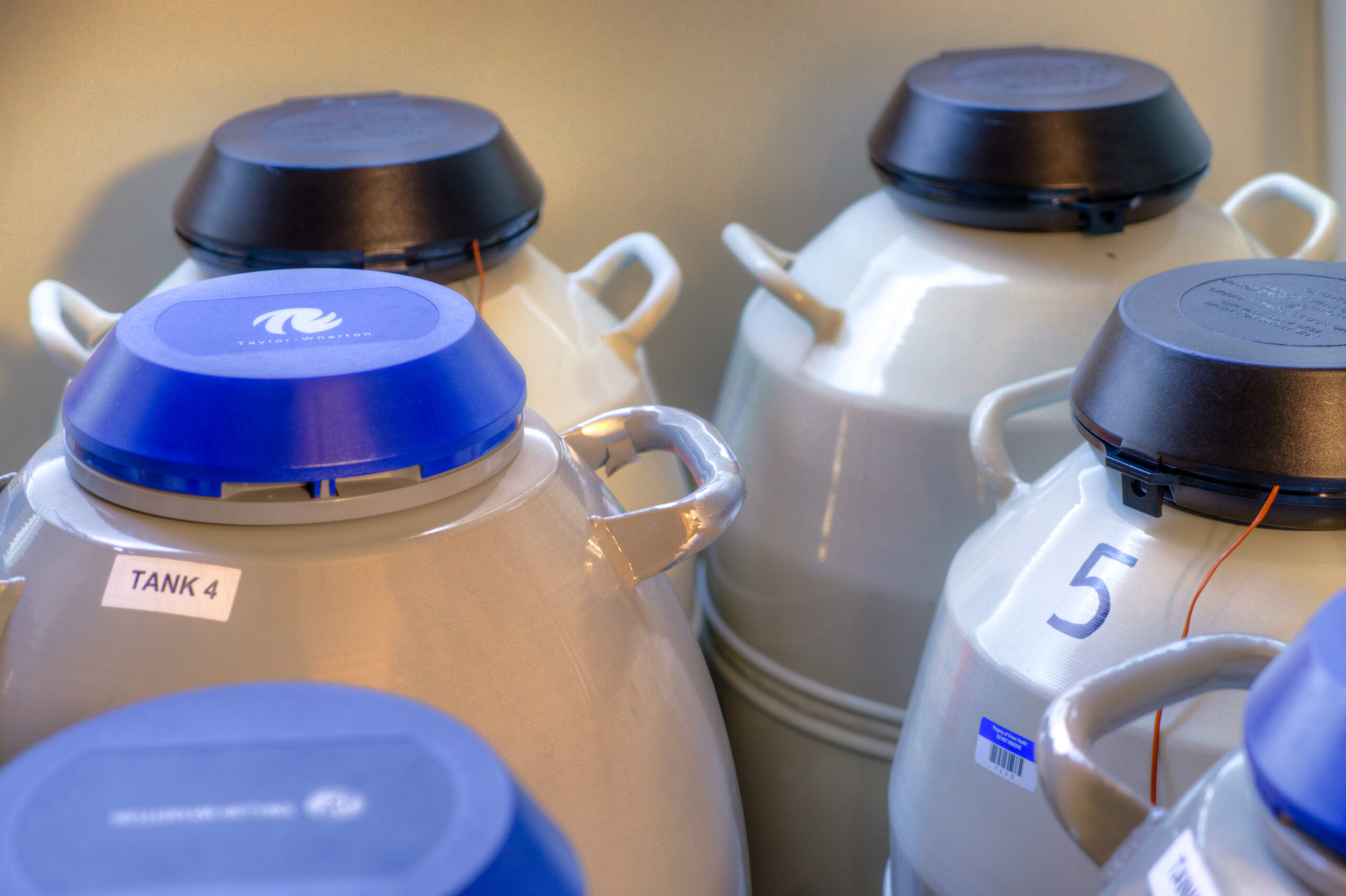
Freeze your eggs, take charge of your future
Egg freezing is a proactive step toward building your family when you’re ready using your youngest and healthiest eggs. CCRM’s expert team is here to guide you through with personalized, proven care.

4 steps to the egg freezing process
Preserving your fertility is simpler than you might think, and in just 3 to 4 weeks, you can be closer to building the family you may want in the future.

Fertility assessment
Bloodwork and ultrasound give insight into your ovarian reserve and overall fertility health, followed by a personalized consultation.

Ovarian stimulation
Daily hormone injections encourage egg growth, carefully monitored through bloodwork and ultrasound to ensure your medications are working safely and effectively.

Egg retrieval
A fertility provider will collect your mature eggs during this outpatient procedure performed under light sedation.

Deep freezing (Cryopreservation)
Your eggs are frozen instantly using advanced vitrification technology and safely stored indefinitely until you’re ready to use them.
Expertise you can trust, support you deserve
Strong outcomes
High patient satisfaction
Financial support
Fewer cycles
Is egg freezing right for you?
Chance of successful pregnancy per month
Natural fertility declines with age
No Data Found
Copyright © 2012 by the American Society for Reproductive Medicine
If you’re not ready to grow your family now but want to keep the option open for the future, elective egg freezing may be a smart choice. Whether you’re focused on your career, health, or still waiting for the right time or partner, the experienced and compassionate team at CCRM can help you decide if preserving your fertility is the best path to help you meet your family building goals.
Fertility freedom made affordable
Financial support includes dedicated financial counselors, insurance coverage, self-pay discounts, and financing options.
Egg freezing services at CCRM
Egg freezing FAQs
Here’s everything you’ve been curious to know about the egg freezing process.
How long does the egg freezing process take?
A timeline is dependent on the individual situation, but the egg freezing process from start to finish typically takes about 6 weeks for most patients, not including the initial consultation, testing, and treatment planning.
What does the egg freezing process involve?
There are three main steps involved in the egg freezing process. First, you will need a fertility assessment involving blood tests and an ultrasound where your doctor can determine your current fertility status. Next, you’ll inject medications to stimulate your ovaries to grow as many eggs as possible. And the final step in the egg freezing process is the egg retrieval, where we will collect and freeze your eggs.
How many eggs should I freeze?
There is no hard and fast number or rule on how many eggs a woman needs to freeze. This number is usually based on your age, your past gynecological/medical history and your family history. It is individualized and should be determined by your doctor based on your situation.
Is freezing your eggs painful?
Some women experience bloating and discomfort during ovarian stimulation (similar to PMS symptoms). The egg retrieval process is done under light sedation and is not painful. After the retrieval, you may experience some mild pain that you can treat with over-the -counter pain relievers.
What are the side effects of egg freezing?
In rare instances (1-5%), “ovarian hyperstimulation syndrome” (OHSS) may occur during ovarian stimulation. OHSS is associated with swollen, enlarged ovaries and the collection of fluid in the abdominal cavity. After the egg retrieval, you might experience spotting, cramping and nausea for a few days.
Do I have to stop birth control before I freeze eggs?
Since birth control pills or patches prevent ovulation, you will need to stop using it before starting the egg freezing process. You can resume using the pill or the patch after your egg retrieval. If you have an IUD, you don’t have to remove it during the egg freezing process.For women that have been using the pill or the patch for a long period of time, we often recommend a month “rest” period (aka stopping birth control for a month). The pill makes your ovaries go to sleep, effectively. So in an effort to maximize your response to fertility medications, we give them an extra month (a month off the pill) to wake up. If you don’t have the time or don’t want to take the month off it isn’t bad or wrong, it just may ultimately make the egg freezing cycle longer (extra days of meds to get those ovaries going!
What is the best age to freeze your eggs?
There is no time like the present; if you come and see us at 38, do it then—don’t think about it for a year and do it at 40. The same goes for a woman who comes in at 30; your eggs are better at 30 than at 32, so if you are thinking about doing it, do it now. There is no “cut off” age but there is an age (generally >42) whereby your ability to produce eggs that are chromosomally normal is significantly reduced and it may not yield the results you are hoping for.
How long can you freeze your eggs?
Can you tell a good egg from a bad egg?
Unfortunately, we cannot. The only information we can tell you about your eggs is if they are mature or immature. A mature egg does not mean it is good quality, but it means that it is at the stage that it can be fertilized (only mature eggs can be fertilized). While there are certain parameters that point to good egg quality (young age) we cannot tell anything about the health of an egg until it is fertilized by a sperm.
Do I need to prepare my body and change my diet before I start the egg freezing process?
While it’s always good to live a healthy life, your eggs have been there with you for your entire life. Making alterations in your lifestyle will likely not change your egg quality. The only exception here is smoking—smoking is not good for your eggs! The sooner you quit the better.
Are there reasons some women may need to freeze their eggs more than others?
Yes! And that’s why it is important to not only share your medical/surgical/gynecological history, but also your mom’s, your sisters and your grandmother’s. We tend to mimic the female members of our family in terms of fertility. So if your mom went through an early menopause you might as well. Also if you have a history of any gynecological conditions (such as endometriosis or PCOS), you want to speak to a fertility doctor early!
Will I hurt my future fertility by freezing my eggs?
If you don’t use them you lose them. Meaning, every month a group of eggs enter the race to become the one that is ovulated. The other eggs that “run the race,” but don’t win just die off. In short, egg freezing does not hurt your future fertility.
How do I check my fertility?
What does a low AMH mean?
Your Anti-müllerian hormone (AMH) levels can help determine your ovarian reserve (how many eggs you have left). Typical AMH levels for a fertile woman is ~ 1.5–4.0 ng/ml. If your AMH is low, this could indicate low ovarian reserve. However, it does not mean that your quality is low!
What makes one fertility clinic lab better than another?
There are many clinics that offer egg freezing, but many of the newer clinics have only frozen eggs (they haven’t thawed eggs or had success creating babies with the eggs they’ve frozen). We recommend finding a clinic that not only freezes eggs, but also performs IVF in-house. Make sure to ask for a clinic’s thaw rates and live birth success rates to get an idea of your chances of a having a baby in the future. The hardest procedures in fertility medicine are egg freezing and embryo biopsy. With egg freezing there is one cell; so you get one chance to do this right. You want to go to a clinic that does this time and time again. You can have good eggs, but if they are frozen in not the best way they won’t work later on!
What are the different ways to freeze eggs?
The most effective way to freeze eggs is through a method called vitrification when the eggs are quickly frozen using nitrogen. This fast-freezing method prevents the fluid in the egg from forming ice crystals, which could damage it. The other method of egg freezing is called slow-freezing or controlled freezing, which freezes the eggs much more slowly, is prone to ice crystals and has lower rates of survival. Currently, almost all major clinics perform vitrification.
Is egg freezing covered by insurance?
Most insurances consider egg freezing an elective procedure and is not covered by insurance. Some states, including Connecticut, Delaware, Illinois, Maryland, New York, and Rhode Island, have passed fertility preservation coverage bills that require coverage of egg freezing after a cancer diagnosis. We recommend consulting your HR/Benefits director to find out your specific fertility benefits.
Can I ship my eggs to a different fertility clinic?

Start your fertility journey
Connect with one of our experienced fertility specialists to explore your options. We’re here to guide and support you every step of the way.




